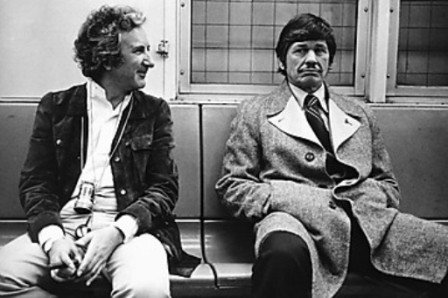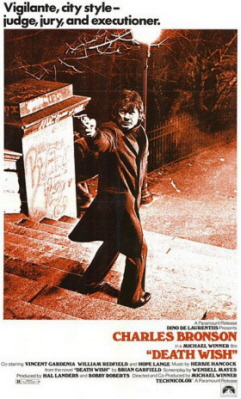January 25, 2013, - 2:02 am
“Death Wish” Director Michael Winner, Of Blessed Memory
Can’t let the week go by without noting the passing of Michael Winner, the multi-talented director of the first three “Death Wish” movies and the original, “The Mechanic,” all of them starring one of my favorite actors, the late Charles Bronson. Although he directed many other films and pursued other career paths in the public eye, Winner was best known for the Death Wish films because mainstream movie critics–all of them liberal at the time–panned them. But they struck a nerve with the rest of America, especially the original 1974 Death Wish, because Americans identified with the main character, Paul Kersey–a wealthy, liberal New York City architect who strikes back after criminals murder his wife and rape his daughter. My late father, a fan of the movie and of Bronson, introduced me to “Death Wish” in 1984, when liberals and authorities were going after Bernhard Goetz for shooting criminal thugs who were about to mug and stab him with sharpened screw drivers on the New York subway and do who knows what else to him.


Paul Winner’s original Death Wish stands the test of time, and with violent crime rising to 1970s levels in places like Detroit and the Obama Administration and liberals like Diane Feinstein trying to take our guns, it is more relevant than ever. I believe I captured the attraction to Winner’s movie in my column on the 35th anniversary of “Death Wish.” Here’s part of it:
Liberals hated “Death Wish,” because of its message that vengeance and vigilantism work. They hated that the hero of the movie is a liberal pacifist who realizes his way is the wrong way. And they hated Charles Bronson for the rest of his life–the rest of his acting career–for playing Paul Kersey, “Death Wish’s” sly, silent, and clever protagonist who shoots criminals after his wife is murdered and his daughter raped into a state of catatonia. They never forgave him for it.
They never forgave Michael Winner for it, either. More:
They say that a conservative is a liberal who’s been mugged. And “Death Wish’s” Paul Kersey was exactly that. A liberal, upper class New York City architect, Kersey goes to fancy parties, and he wants to make affordable housing for poor in prime New York real estate. He was a conscientious objector in the Korean War because he’s against guns like his mother was. He wants to have sex on the Maui beach out in the open in the middle of the day (instead of their hotel room), but his wife tells him they’re too civilized. When he returns from Hawaii and his colleague at work tells him about the acceleration of the New York City murder rate, he responds,
My heart bleeds a little for the underprivileged.
But then–once his loved ones become victims and casualties of violent crime–-he changes. And he changes the world in which he lives.
Once Paul Kersey starts attacking muggers, the mugging rate in the City is reduced by more than half. He inspires others to respond with vigor to would-be attackers. An old Black woman attacks muggers with a hat pin, and they run away. Men on a construction site beat a thug senseless. The district attorney doesn’t want Kersey arrested because he knows that prosecuting this folk hero won’t go over well.
Even some of the liberals at the fancy Manhattan penthouse parties that Kersey attends adjust their attitudes. It’s there that my favorite dialogue in the movie takes place:
Man: I’ll tell you one thing: the guy’s a racist. You notice he kills more Blacks than Whites.
Woman: Oh, for Pete’s sake, Harry. More Blacks are muggers than Whites. What do you want to do–increase the proportion of White muggers, so we’ll have racial equality among muggers?
And the movie pointedly exposes the problems with New York’s gun control laws (Bronson sneaks his gun, a gift from a client in Tucson).
Yes, it was a great movie and very insightful, especially with the renewed push to further constrain our Second Amendment rights. And it shall remain evergreen on the issue of crime and justice, thanks to the brilliant director hated by Hollywood and film critics but loved by many Americans with whom he struck a chord.
Winner was the son of a well-to-do Jewish family in Great Britain. His mother reportedly gambled away an estimated eight million pounds of the family’s money. But he made it on his own, beginning a celebrity interview column when he was only 14. After his career as a movie director, he became the restaurant critic for the Sunday Times of London. He also was known for his friendships with the high and mighty, including Queen Elizabeth, and for setting up a trust to honor British police killed in action. Ironically, unlike Paul Kersey in the “Death Wish” movies, the British police are unarmed.
Winner died of heart and liver ailments and had been given 18 months to two years to live, back in October. He left his 46-room Victorian Mansion to the state to become a museum. He was buried on Wednesday in Willesden Jewish Cemetery in North London.
Michael Winner, Zichrono LiVrachah [Blessed Be His Memory, which we Jews say for other Jews in lieu of “Rest In Peace”].
Tags: Charles Bronson, Death Wish, Death Wish Director, Directors, Jewish celebrities, Jews, Michael Winner, North London, The Mechanic, Willesden Jewish Cemetery


Death Wish opened my eyes.
RIP MR WINNER …
As goes... on January 25, 2013 at 5:40 am